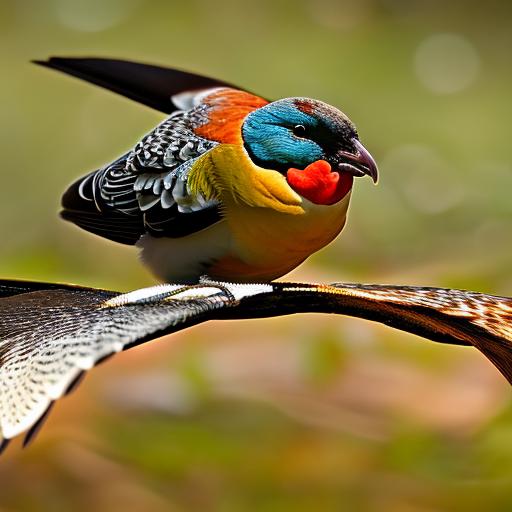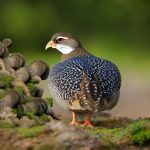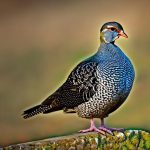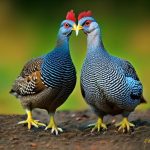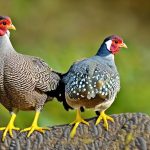Guinea birds, also known as guinea fowl, are fascinating creatures with unique behavioral patterns. These birds are highly social and are often found in groups called flocks. They are known for their loud calls and distinctive feather patterns, which make them easily recognizable in the wild. Guinea birds are ground-dwelling birds and are often seen foraging for food in open grasslands and woodlands. They are omnivorous and have a varied diet that includes seeds, insects, and small reptiles.
Guinea birds are also known for their strong flight capabilities, which they use to escape from predators and to travel long distances in search of food and water. They are highly adaptable birds and can thrive in a variety of habitats, from savannas to farmlands. Guinea birds are also known for their strong territorial instincts and will defend their nesting sites and feeding areas from intruders. Overall, guinea bird behavior is complex and fascinating, making them a popular subject for bird watchers and researchers alike.
Guinea birds are also known for their strong territorial instincts and will defend their nesting sites and feeding areas from intruders. Overall, guinea bird behavior is complex and fascinating, making them a popular subject for bird watchers and researchers alike.
Key Takeaways
- Guinea birds are social animals that thrive in the company of their own kind, as well as other fowl.
- Guinea birds are known for their unique behavior, such as their reaction to wing breaks and their ability to form mixed flocks with other bird species.
- When a guinea bird experiences a wing break, it is important to provide immediate support and care to ensure its well-being.
- Observing guinea birds in mixed flocks can provide valuable insights into their behavior and interactions with other bird species.
- Understanding the social nature and behavior of guinea birds is crucial for providing the necessary support and care, especially in the case of injury.
The Social Nature of Guinea Birds
Guinea birds are highly social creatures and are often found in large flocks. These flocks can consist of dozens of birds and are typically led by a dominant male. Within the flock, there is a strict social hierarchy, with dominant individuals asserting their authority over subordinates. Guinea birds communicate with each other through a series of calls and displays, which help to maintain social cohesion within the group.
In addition to their social interactions within the flock, guinea birds also form strong pair bonds with their mates. These bonds are often long-lasting and play a crucial role in the reproductive success of the species. Guinea birds are known for their elaborate courtship displays, which involve vocalizations, strutting, and wing-fluttering. These displays help to strengthen the pair bond and ensure successful breeding.
Overall, the social nature of guinea birds is a key aspect of their behavior and plays a crucial role in their survival and reproductive success in the wild.
How Guinea Birds React to Wing Breaks
Guinea birds are known for their strong flight capabilities, which they use to escape from predators and to travel long distances in search of food and water. However, like all birds, guinea birds are susceptible to wing injuries, which can have a significant impact on their ability to survive in the wild. When a guinea bird suffers a wing break, it can be a devastating blow to its ability to forage for food and escape from predators.
In response to wing breaks, guinea birds often become more vulnerable and may rely on the protection of their flock mates for survival. In some cases, injured guinea birds may be shunned by the rest of the flock, making it difficult for them to find food and water. However, in other cases, the flock may rally around the injured bird, providing it with protection and support until it is able to recover.
Overall, wing breaks can have a significant impact on the behavior of guinea birds, affecting their ability to survive in the wild and highlighting the importance of social support within the flock.
The Importance of Company for Guinea Birds
Guinea birds are highly social creatures and rely on the company of their flock mates for protection, foraging, and reproductive success. In the wild, guinea birds are rarely seen alone and are almost always found in the company of other birds. This social behavior is not only important for the survival of individual birds but also plays a crucial role in maintaining the cohesion of the flock as a whole.
The presence of company provides guinea birds with a sense of security, as they are able to rely on the vigilance of their flock mates to detect potential threats. In addition, the company of other birds can also provide guinea birds with opportunities for social interaction, courtship displays, and mating opportunities. Overall, the importance of company for guinea birds cannot be overstated, as it plays a crucial role in their daily lives and overall survival in the wild.
Guinea Birds and Fowl: A Unique Relationship
Guinea birds have a unique relationship with other fowl species, often forming mixed flocks with chickens, ducks, and other domesticated birds. This relationship is beneficial for both guinea birds and other fowl species, as it provides them with increased protection from predators and opportunities for social interaction. In mixed flocks, guinea birds often take on the role of sentinels, using their keen eyesight and loud calls to alert other members of the flock to potential threats.
In addition to providing protection, mixed flocks also provide guinea birds with opportunities for social interaction and mating opportunities with other fowl species. This can lead to hybridization between guinea birds and other fowl species, producing unique offspring with a combination of traits from both parents. Overall, the relationship between guinea birds and other fowl species is complex and mutually beneficial, highlighting the adaptability and social nature of guinea birds.
Observing Guinea Birds in Mixed Flocks
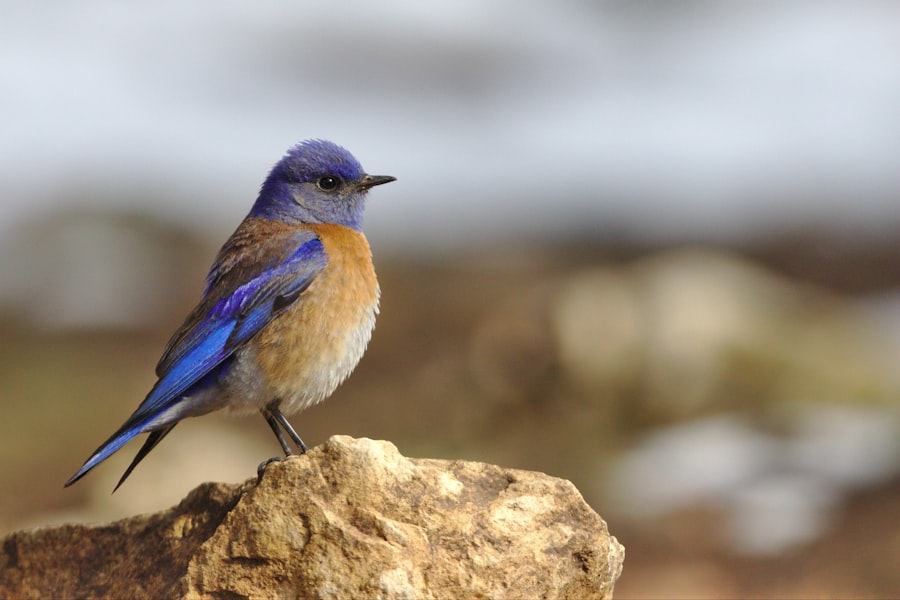
Observing guinea birds in mixed flocks with other fowl species can provide valuable insights into their behavior and social dynamics. In mixed flocks, guinea birds often take on the role of sentinels, using their keen eyesight and loud calls to alert other members of the flock to potential threats. This behavior is not only beneficial for the guinea birds themselves but also provides protection for other fowl species within the flock.
In addition to their role as sentinels, guinea birds also engage in social interactions with other fowl species within the mixed flock. This can include courtship displays, mating opportunities, and even hybridization between guinea birds and other fowl species. Observing these interactions can provide valuable information about the social dynamics and reproductive behavior of guinea birds in mixed flocks.
Providing Support for Injured Guinea Birds
When a guinea bird suffers a wing break or other injury, it is important to provide it with support and care to ensure its recovery. Injured guinea birds may require protection from predators and access to food and water while they heal. In some cases, injured guinea birds may need to be separated from the rest of the flock to prevent further injury or stress.
In addition to physical support, injured guinea birds may also benefit from emotional support from their flock mates. The presence of company can provide injured guinea birds with a sense of security and comfort during their recovery process. Overall, providing support for injured guinea birds is crucial for their well-being and eventual return to normal behavior within the flock.
When guinea bird wing break they keep company with fowl, it’s important to ensure that the coop is spacious enough to accommodate both types of birds comfortably. To learn more about the ideal coop size for chickens and how to create a suitable living space for them, check out this informative article on poultrywizard.com. Additionally, if you’re interested in providing a diverse diet for your ducks, you can find valuable insights on what to feed ducks in this helpful article on poultrywizard.com.
FAQs
What is a guinea bird?
A guinea bird, also known as a guinea fowl, is a bird native to Africa. It is known for its distinctive spotted feathers and loud, distinctive call.
What happens when a guinea bird’s wing breaks?
When a guinea bird’s wing breaks, it may have difficulty flying and may require assistance in order to move around. In some cases, the bird may be unable to fly at all.
Do guinea birds keep company with other fowl when their wing breaks?
Yes, guinea birds are known to keep company with other fowl, such as chickens or other domestic birds, when they are unable to fly due to a wing injury. They may form social bonds with these other birds and may even rely on them for protection and companionship.
How can a broken wing in a guinea bird be treated?
Treatment for a broken wing in a guinea bird may involve immobilizing the wing and providing supportive care, such as rest and pain management. In some cases, a veterinarian may need to be consulted for further treatment options.
Can a guinea bird with a broken wing recover and fly again?
In some cases, a guinea bird with a broken wing may be able to recover and regain the ability to fly, especially with proper treatment and care. However, the extent of the injury and the bird’s overall health will play a significant role in the recovery process.
Meet Walter, the feathered-friend fanatic of Florida! Nestled in the sunshine state, Walter struts through life with his feathered companions, clucking his way to happiness. With a coop that’s fancier than a five-star hotel, he’s the Don Juan of the chicken world. When he’s not teaching his hens to do the cha-cha, you’ll find him in a heated debate with his prized rooster, Sir Clucks-a-Lot. Walter’s poultry passion is no yolk; he’s the sunny-side-up guy you never knew you needed in your flock of friends!

